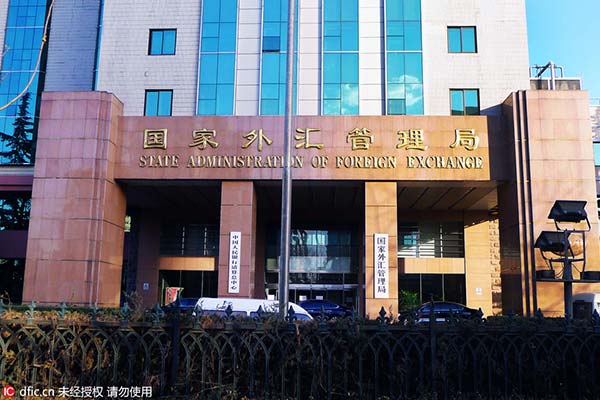View of the headquarters and head office of the State Administration of Foreign Exchange (SAFE), in Beijing, January 25, 2013.[Photo/IC]

Analyst says Wutongshu is playing key role in management of foreign exchange reserves
The State Administration of Foreign Exchange has started to allocate funds through its investment platform in the mainland's A-share market, a move believed to perfect its foreign exchange management and promote the development of the domestic capital market, experts said.
Wutongshu Investment Platform Co Ltd, a platform wholly owned by the SAFE, has just become a major shareholder of Bank of Communications Co, Industrial and Commercial Bank of China, Bank of China, Shanghai Pudong Development Bank and Everbright Securities Co Ltd.
The amount of A shares held by Wutongshu and its two wholly owned subsidiaries known as Fengshan Investment and Kunteng Investment totaled more than 27 billion yuan ($4.2 billion), according to Shanghai Securities News.
Liu Jipeng, director of the Capital Research Center at the China University of Political Science and Law, said that Wutongshu is playing an important role in China's foreign exchange management and the development of the A-share and H-share markets.
"I am glad to see Wutongshu in the Chinese A-share market, which is in line with the national strategy of raising the proportion of direct financing," said Liu.
"It not only helps China's foreign exchange regulator better use the huge amount of foreign exchange reserves, but offers ample funds and boosts confidence in the domestic stock market."
China's foreign exchange reserves totaled $3.2 trillion at the end of February, decreasing $28.6 billion compared with January, according to the People's Bank of China, the nation's central bank.
Liu said Wutongshu should be a value investor and seek shares with good liquidity.
"Wutongshu in the A-share market signals that China is setting up a general mechanism for the domestic capital market," said Niu Huayong, dean of the Business School at Beijing Foreign Studies University.
Niu said the government used to carry out emergency measures to stabilize the market such as the way it dealt with the stock market slump which started in June last year.
"And now, Wutongshu backed by the SAFE will be always in the A-share market to make investments and handle problems in advance," said Niu.
Niu added that market-oriented regulations in the domestic stock market should be a foundation for Wutongshu to make an impact.
Yan Liliang, a financial columnist at Securities Daily, said Wutongshu, along with Central Huijin Investment Ltd and China Securities Finance Co Ltd, will be China's three main stock market stabilization funds.
"Wutongshu entering the A-share market shows that China is positively conducting financial reforms," said Yan.
The annual reports of ICBC and BOC released on Wednesday showed that Wutongshu held 1.42 billion shares (0.4 percent) in ICBC, and 1.06 billion shares (0.36 percent) in BOC.
The annual report of Bank of Communications published on Tuesday showed that Wutongshu held 794.6 million shares in the bank, accounting for 1.07 percent of the total.
Wutongshu was not a top 10 shareholder of any of the three banks in the third quarter of 2015.
The benchmark Shanghai Composite Index rose 0.11 percent to close at 3,003.92 points on Thursday. The Shenzhen Component Index gained 0.09 percent, while the startup index ChiNext dropped 0.47 percent.
Zhou Xiaochuan, governor of the People's Bank of China, said in February that China has the world's largest foreign exchange reserves and will not allow speculators to dominate market sentiment.
The Beijing-based Wutongshu investment platform was established in November 2014 with registered capital of 100 million yuan.
Wutongshu invested $48 billion in China Development Bank, which provides medium- and long-term financing to major national projects, and another $45 billion in Export-Import Bank of China, a policy bank focusing on export and import loans, according to a statement by the People's Bank of China in August.
